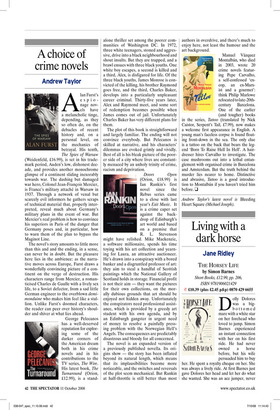A choice of crime novels
Andrew Taylor
Alan Furst’s e s p i o nage novels have a melancholic tinge, depending, as they so often do, on the debacles of recent history and, on a personal level, on the mechanics of betrayal. His tenth, The Spies of Warsaw (Weidenfeld, £16.99), is set in his trademark period, Auden’s low, dishonest decade, and provides another monochrome glimpse of a continent sliding inexorably towards war. The dashing but damaged war hero, Colonel Jean-François Mercier, is France’s military attaché in Warsaw in 1937. Through a network of venal but scarcely evil informers he gathers scraps of technical material that, properly interpreted, reveal much about Germany’s military plans in the event of war. But Mercier’s real problem is how to convince his superiors in Paris of the danger that Germany poses and, in particular, how to warn them of the plan to bypass the Maginot Line.
The novel’s story amounts to little more than this and and the ending, in a sense, can never be in doubt. But the pleasure here lies in the ambience: as the narrative moves across Europe, Furst draws a wonderfully convincing picture of a continent on the verge of destruction. His characters range from Mercier, a romanticised Charles de Gaulle with a lively sex life, to a Soviet defector, from a sad little German engineer to the overblown demimondaine who makes him feel like a stallion. Unlike Furst’s doomed characters, the reader can peer over history’s shoulder and shiver at what lies ahead.
George Pelecanos has a well-deserved reputation for exploring some of the darker corners of the American dream both in his crime novels and in his contributions to the TV series, The Wire. His latest book, The Turnaround (Orion, £12.99), is a stand alone thriller set among the poorer communities of Washington DC. In 1972, three white teenagers, stoned and aggressive, drive into a black neighbourhood and shout insults. But they are trapped, and a brawl ensues with three black youths. One white boy escapes, a second is killed and a third, Alex, is disfigured for life. Of the three black youths, James Monroe is convicted of the killing, his brother Raymond goes free, and the third, Charles Baker, develops into a particularly unpleasant career criminal. Thirty-five years later, Alex and Raymond meet, and some sort of redemption becomes possible when James comes out of jail. Unfortunately Charles Baker has very different plans for them.
The plot of this book is straightforward and largely familiar. The ending will not convince everybody. But Pelecanos is skilled at narrative, and his characters’ dilemmas are evoked grimly and vividly. Best of all is his bleak picture of the poorer side of a city where lives are constantly menaced by an unholy trinity of crime, racism and deprivation.
Doors Open (Orion, £18.99) is Ian Rankin’s first novel since the Rebus series came to a close with last year’s Exit Music. It is a crime caper set against the backdrop of Edinburgh’s art world and based on a premise that R. L. Stevenson might have relished. Mike Mackenzie, a software millionaire, spends his time toying with his art collection and yearning for Laura, an attractive auctioneer. He’s drawn into a conspiracy with a bored banker and a disgruntled professor of art: they aim to steal a handful of Scottish paintings which the National Gallery of Scotland holds in storage. Financial profit is not their aim — they want the pictures for their own collections, on the morally dubious grounds that art should be enjoyed not hidden away. Unfortunately the conspirators need professional assistance, which is provided by a greedy art student with his own agenda, and by an Edinburgh gangster in urgent need of money to resolve a painfully pressing problem with the Norwegian Hell’s Angels. The consequences are predictably disastrous and bloody for all concerned.
The novel is an expanded version of a previously published novella. Its origins show — the story has been inflated beyond its natural length, which means that its implausibilities become more noticeable, and the switches and reversals of the plot seem mechanical. But Rankin at half-throttle is still better than most authors in overdrive, and there’s much to enjoy here, not least the humour and the art background.
Manuel Vázquez Montalbán, who died in 2003, wrote 20 crime novels featuring Pepe Carvalho, a self-confessed ‘excop, an ex-Marxist and a gourmet’: think Philip Marlowe relocated to late-20thcentury Barcelona. One of the earlier (and tougher) books in the series, Tattoo (translated by Nick Caistor, Serpent’s Tail, £7.99), now makes a welcome first appearance in English. A young man’s faceless corpse is found floating front-down in the sea. The only clue is a tattoo on the back that bears the legend ‘Born To Raise Hell In Hell’. A hairdresser hires Carvalho to investigate. The case mushrooms out into a lethal entanglement with organised crime in Barcelona and Amsterdam. But the truth behind the murder lies nearer to home. Distinctive and abrasive, Tattoo is a good introduction to Montalbán if you haven’t tried him before. q Andrew Taylor’s latest novel is Bleeding Heart Square (Michael Joseph).










































































 Previous page
Previous page